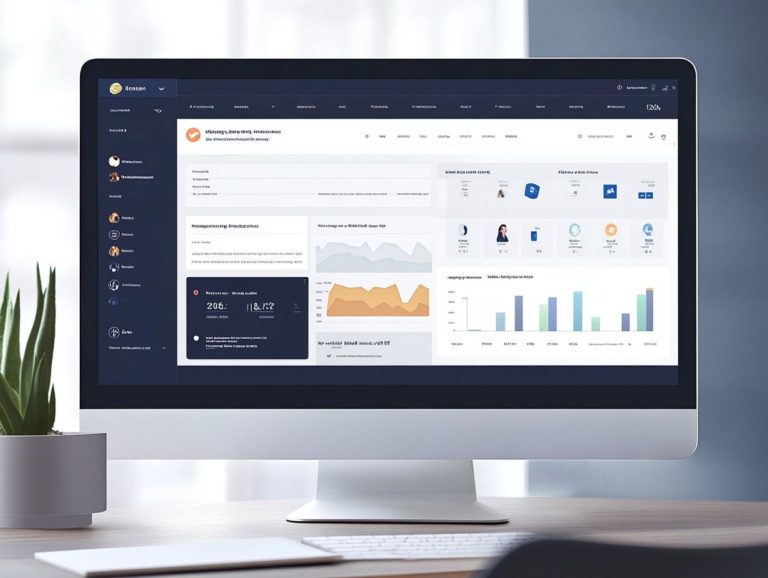What Are the Costs of CRM Software Implementation?
Understanding the costs of CRM software implementation is crucial for your business. Let’s dive into how you can optimize your investment and improve customer relationships!
This article delves into the key factors that influence these costs, such as the size and complexity of your operations, your specific customization needs, and the necessary training and support you may require.
You ll also find practical strategies to minimize costs while maximizing the benefits of your CRM investment.
It also sheds light on hidden expenses that could take you by surprise, ranging from data migration to extra licenses.
Contents
- Key Takeaways:
- Factors Affecting the Cost of CRM Software Implementation
- Hidden Costs to Consider
- Ways to Reduce CRM Software Implementation Costs
- Choosing the Right Vendor
- Effective Planning and Project Management
- Utilizing Resources and Tools
- Frequently Asked Questions
- What Are the Costs of CRM Software Implementation?
- What Hidden Costs Should You Watch Out for in CRM Implementation?
- How Can I Estimate the Total Costs of CRM Software Implementation?
- What Factors Can Affect the Costs of CRM Software Implementation?
- Are There Ways to Cut CRM Software Costs?
- How Can I Guarantee My CRM Software Will Pay Off?
Key Takeaways:

CRM software implementation costs are affected by factors such as business size and complexity, customization needs, and training and support requirements.
Hidden costs like data migration, integration, and additional licenses should be considered when budgeting for CRM software implementation.
To reduce CRM software implementation costs, businesses can choose the right vendor, plan effectively, and utilize resources and tools efficiently.
What is CRM Software Implementation?
CRM software implementation involves configuring and deploying CRM systems to boost your organizational efficiency and productivity. It s a careful blend of technical skills and smart planning, ensuring that the software aligns perfectly with your business objectives.
This not only optimizes your workflows but also enhances your customer service outcomes. The journey begins with careful planning! Pinpoint your specific goals and requirements tailored to your organization s unique context.
Then comes the system configuration phase. You ll customize the software to effectively manage customer data and automate repetitive tasks, significantly streamlining your operations.
Deployment is where the magic happens. It s essential to integrate the software into your existing workflows seamlessly.
Additionally, you ll need to train your employees to harness analytics for smarter decision-making.
Each of these stages is crucial, ensuring that your CRM solution addresses immediate needs while laying the groundwork for long-term growth and elevated customer satisfaction.
Factors Affecting the Cost of CRM Software Implementation
The cost of implementing CRM software can fluctuate considerably, influenced by various factors such as the size of your organization, the details of how you sell, and the level of customization you require.
It s essential for you to thoroughly assess your specific needs and keep an eye on market trends to identify the pricing plans that best balance features with your budgetary limitations.
Size and Complexity of Business
The size and complexity of your business are pivotal in determining the cost of CRM software implementation. Larger organizations typically require more sophisticated solutions to handle their extensive customer data and intricate sales processes.
In contrast, if you’re running a smaller business, you may find that simpler CRM systems are sufficient, focusing primarily on essential transaction management and customer interactions.
Your unique requirements will often shape your choice of software modules. For instance, a multinational corporation might demand advanced analytics, automated workflows, and integrations with various platforms.
Meanwhile, a startup could thrive with a streamlined, budget-friendly solution that prioritizes lead tracking and basic communication functionalities.
Grasping these dynamics is essential for you as you select the right CRM to effectively enhance your customer relationships.
Customization Needs
Customization needs profoundly impact the costs of implementing CRM software. Tailored solutions can enhance user experience and operational efficiency by aligning with your specific business workflows and sales processes.
The versatility of custom CRM systems enables you to select from a diverse array of solutions, including industry-specific functionalities, personalized dashboards, and automated reporting features. This adaptability allows your teams to optimize performance tracking and streamline lead generation effectively.
By leveraging custom integrations with your existing tools and platforms such as email marketing services and analytics applications you can enhance collaboration and ensure data accessibility.
Ultimately, embracing customization in CRM systems cultivates a more intuitive user experience, drives better decision-making, and boosts overall productivity across your teams.
Training and Support

Training and support are vital for CRM software implementation. They ensure you and your team can fully use the system to enhance customer service and boost operational productivity.
You ll encounter various training programs tailored to meet diverse organizational needs. User training focuses on daily application, while technical support addresses more complex system challenges.
User training showcases real-time scenarios to enrich your experience. Technical support explains system maintenance and uncovers potential hidden costs from insufficient training.
Combining user training and technical support helps cultivate a more skilled user base and reduces the risks of underutilizing the software. This sets you up for a smoother transition and long-term success!
Hidden Costs to Consider
When evaluating the costs of implementing CRM software, remain vigilant about hidden expenses that may surface. These can arise from moving your existing data to a new system, system integration, and ongoing maintenance costs that might not be immediately obvious during your initial budgeting process.
Data Migration and Integration
Data migration and integration are crucial elements of CRM implementation that can come with significant hidden costs. Moving your existing customer data to a new system requires careful planning to ensure data integrity.
Employing best practices, like establishing a clear strategy and assessing data quality beforehand, can enhance efficiency while minimizing operational costs. Utilizing reliable migration tools is also essential.
Adopting methodologies like incremental migration enables you to avoid overwhelming your systems and ensures a smoother transition. Using combined solutions, such as cloud-based CRM platforms, allows better synchronization with existing systems, streamlining data access and enhancing overall CRM architecture.
This approach fosters improved decision-making and supports quicker ROI by aligning your technological capabilities with your business objectives.
Additional Licenses and Modules
Additional licenses and software modules can lead to extra costs during CRM software implementation, particularly if you choose a system with tiered pricing plans based on features and user count.
These enhancements can notably elevate the system’s capabilities and tailor it to meet your specific business needs. However, weigh these advantages against the potential rise in total expenses.
Each added module and license can increase your initial investment and escalate ongoing maintenance fees. Therefore, carefully evaluate your operational requirements, considering how these additional functionalities align with your objectives while keeping a watchful eye on budget constraints that could influence other vital areas of your business investment.
Ways to Reduce CRM Software Implementation Costs
Organizations aiming to reduce CRM software implementation costs can adopt a strategic approach by carefully selecting vendors and refining project management processes. This enables them to streamline workflows and eliminate unnecessary expenses, ensuring a more efficient implementation journey.
Choosing the Right Vendor

Choosing the right vendor is a pivotal step in your Customer Relationship Management (CRM) software implementation journey. This choice can greatly influence the project’s success and the system’s effectiveness in addressing your unique needs.
When evaluating potential vendors, consider their reputation within the industry. A solid track record often reflects reliability and trustworthiness, which are essential in this partnership.
Understanding the level of technical support they offer is crucial. Timely assistance can enhance your experience and confidence in the system.
Flexibility in customization options is another important aspect to keep in mind. You ll want a vendor that offers solutions adaptable to your specific business requirements. This ensures that the CRM system aligns seamlessly with your existing workflows and user habits.
Effective Planning and Project Management
Effective planning and project management are essential for successfully implementing CRM software. Setting clear deadlines keeps your project on track and saves money.
By employing structured processes, your team can enhance organization and boost efficiency. Comprehensive tools streamline communication and task tracking, ensuring that everyone involved remains aligned with project goals and timelines.
Establishing clear timeframes improves resource management, ultimately lowering operational costs and increasing your overall return on investment. When these components work together harmoniously, they create smoother transitions and elevate the likelihood of meeting or even exceeding stakeholder expectations.
This underscores the strategic significance of meticulous planning in any CRM initiative.
Utilizing Resources and Tools
Utilizing the right resources and tools can significantly enhance the efficiency of your CRM software implementation. This enables you to streamline processes and reduce overall costs.
By leveraging advanced project management platforms and robust data integration solutions, you can ensure a smoother transition while maximizing productivity. These resources foster better communication among your team members and support meticulous tracking of progress and performance metrics.
Employing automation tools helps minimize manual errors, enhancing data management and accuracy. As you adopt these technologies, the reduction in operational costs will become evident. This allows you to reallocate resources towards more strategic initiatives that drive growth and elevate customer satisfaction.
Frequently Asked Questions
What Are the Costs of CRM Software Implementation?
The costs of CRM software implementation can vary greatly depending on your business’s size and needs. To better understand these expenses, you should explore what the costs of CRM software include, such as software licensing fees, customization and integration costs, training and support fees, and ongoing maintenance costs.
What Hidden Costs Should You Watch Out for in CRM Implementation?

While some CRM software providers may advertise low initial costs, be aware of potential hidden fees. These can include additional charges for extra features, modules, or user licenses, as well as fees for data migration or technical support.
How Can I Estimate the Total Costs of CRM Software Implementation?
To get a better idea of the total costs of CRM software implementation, actively partner with your software provider to discuss your specific needs and requirements. They can provide a detailed breakdown of all involved costs, as well as potential add-ons or additional services that may impact the overall cost.
What Factors Can Affect the Costs of CRM Software Implementation?
The costs of CRM software implementation can be affected by various factors. These include the complexity of your business processes, the number of users, the level of customization and integration required, and the chosen deployment model (cloud-based or on-premise). The reputation and pricing model of the CRM software provider can also impact costs.
Start evaluating vendors today to secure the best fit for your business!
Are There Ways to Cut CRM Software Costs?
CRM software costs can seem high. However, you can reduce them by choosing a cloud-based solution, which cuts out expensive hardware and IT maintenance.
Another option is to start with a basic package. You can add features later as your business grows.
How Can I Guarantee My CRM Software Will Pay Off?
Getting a good return on investment (ROI) from CRM software depends on how well your team uses it. To boost your chances of success, plan your implementation carefully.
Provide thorough training for your employees. Regularly review how the software is being used to ensure you re getting the most out of it.






